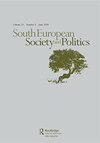在“左翼政府”的阴影下:2019年葡萄牙议会选举
IF 4.6
1区 社会学
Q1 POLITICAL SCIENCE
引用次数: 6
摘要
本文考察了葡萄牙2019年的立法选举,这次选举是在亲欧中左翼和疑欧激进左翼前所未有的合作之后举行的。这个联盟最初被认为是一个“精巧的装置”,但它与最初的期望不符,并逐渐成为南欧社会民主党派的参考。然而,尽管民众的授权似乎得到了加强,但在2019年大选后并没有得到维持。我们确定了三个因素。首先,我们认为2015-19年的“精巧设计”是一个弱合同议会制的例子,这使得不续约变得更容易。其次,社会党的选举胜利使得左翼政党之间的交易变得不那么必要了。第三,各方在方案上的长期分歧阻碍了合作。最后,应该指出的是,这个“精巧的装置”影响了左翼政党之间的关系,以及2019年议会政党数量的增加,尤其是右翼政党。本文章由计算机程序翻译,如有差异,请以英文原文为准。
In the Shadow of the ‘Government of the Left’: The 2019 Legislative Elections in Portugal
ABSTRACT This article examines the Portuguese 2019 legislative election, which took place after a period of unprecedented and unexpected cooperation of the pro-European centre left and eurosceptic radical left. Initially dismissed as a ‘contraption’, this alliance belied the initial expectations and increasingly became a reference for South European social democratic parties. Yet, despite a seemingly reinforced popular mandate, it was not maintained after the 2019 election. We identify three factors for this. First, we suggest that the 2015–19 ‘contraption’ was a case of weak contract parliamentarism, making it easier not to renew. Second, the electoral victory of the Socialist Party made deals between the left-wing parties less necessary. Third, enduring programmatic differences between those parties hindered cooperation. Finally, it should be noted that the ‘contraption’ impacted interparty relations on the left and the expansion in the number of parliamentary parties in 2019, notably on the right.
求助全文
通过发布文献求助,成功后即可免费获取论文全文。
去求助
来源期刊

South European Society and Politics
Multiple-
CiteScore
5.80
自引率
21.20%
发文量
14
期刊介绍:
A leading point of reference for scholars of Southern Europe, South European Society and Politics promotes both comparative and inter-disciplinary analyses, as well as offering innovative single county and sub-national studies. The journal acts as a forum for social, economic, cultural, contemporary historical and political approaches to research on the region, and is particularly keen to sponsor policy–focused studies in all these disciplines. The journal publishes research articles; South European Atlas with election reports and articles on other subjects of topical interest, and an extensive book reviews section, including both review articles and individual book reviews.
 求助内容:
求助内容: 应助结果提醒方式:
应助结果提醒方式:


